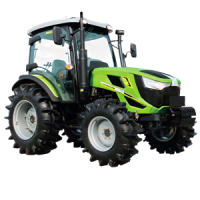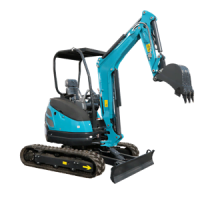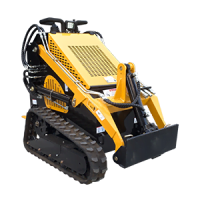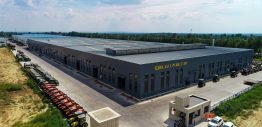Exploring the Diverse Types of Tractors and Their Applications
Introduction
 Tractors, the versatile workhorses of agriculture, come in a myriad of forms tailored to specific tasks. These agricultural titans have evolved beyond the standard plowing and tilling, diversifying into a spectrum of specialized types. In this comprehensive article, we delve into the world of tractors, unraveling the various types and their unique applications that drive modern farming practices.
Tractors, the versatile workhorses of agriculture, come in a myriad of forms tailored to specific tasks. These agricultural titans have evolved beyond the standard plowing and tilling, diversifying into a spectrum of specialized types. In this comprehensive article, we delve into the world of tractors, unraveling the various types and their unique applications that drive modern farming practices.
The Backbone of Agriculture: General-Purpose Tractors
H2: A Multifunctional Powerhouse
General-purpose tractors, also known as utility tractors, are the backbone of farming operations. With moderate horsepower and versatility, they can handle a range of tasks, from tilling and planting to mowing and light hauling. Their adaptability makes them a staple on farms of all sizes.
H2: Application Flexibility
General-purpose tractors are the go-to choice for small to medium-sized farms due to their versatility. They can be equipped with a variety of attachments such as plows, cultivators, and front-end loaders, allowing them to tackle different tasks throughout the farming cycle.
Specialized Precision: Row Crop Tractors
H2: Precision Planting and Harvesting
Row crop tractors are designed for precision farming, particularly in row-planted crops like corn, cotton, and soybeans. These tractors feature adjustable track widths to align with crop rows, minimizing soil compaction and optimizing planting and harvesting efficiency.
H2: Advanced Technology Integration
Modern row crop tractors often incorporate GPS guidance systems and automated steering. This technology ensures precise row alignment, reducing overlap and optimizing seed and fertilizer placement, ultimately leading to higher yields.
Brawns for the Big Fields: Big Tractors
H2: Heavy-Duty Performance
Big tractors, also known as large wheeled or articulated tractors, are the behemoths of the agricultural world. With substantial horsepower and robust construction, they are designed to handle large-scale farming tasks such as deep plowing, heavy hauling, and large implement operation.
H2: Tackling Tough Terrain
Big tractors excel in challenging conditions, like deep tillage in heavy soils. Their high traction capabilities and immense power enable them to conquer demanding tasks with ease, making them indispensable for large farms and extensive acreage.
Navigating Precision: Compact Tractors
H2: Small Size, Big Impact
Compact tractors are the jack-of-all-trades for small-scale and hobby farmers. Despite their size, they pack a punch with various attachments, making them ideal for tasks like landscaping, gardening, and light material handling.
H2: Residential and Commercial Applications
Compact tractors find their place beyond traditional farming, serving residential and commercial purposes. From maintaining lawns to clearing snow, these versatile machines cater to a diverse range of needs.
Off to the Orchards: Orchard Tractors

H2: Orchards and Vineyards
Orchard tractors are designed to maneuver within tight spaces and narrow rows, making them ideal for orchards and vineyards. With adjustable width and height configurations, they can navigate through fruit-laden trees without causing damage.
H2: Crop-Specific Adaptations
Orchard tractors often come with low profiles and protective features to prevent crop damage. They are equipped with attachments like pruning equipment and specialized sprayers to cater to the unique needs of fruit and nut cultivation.
Tackling the Terrain: Specialty Tractors
H2: Tackling Niche Tasks
Specialty tractors are engineered for specific tasks that demand unique configurations. They encompass a wide range of roles, from slope mowing to dairy farm chores. Their adaptations enable them to excel in niche applications.
H2: Dairy and Livestock Farming
In the realm of dairy farming, specialty tractors assist in feed management, barn cleaning, and manure spreading. Their compact size and maneuverability prove invaluable in tight spaces, ensuring efficient operations.
Frequently Asked Questions (FAQ)
H2: Unveiling the Tractor Diversity
H3: 1. What sets row crop tractors apart from general-purpose tractors?
Row crop tractors are tailored for precise row planting and harvesting, with features like adjustable track widths and advanced technology for accurate row alignment. General-purpose tractors are more versatile for a range of tasks.
H3: 2. Are big tractors only suited for large farms?
While big tractors excel in large-scale operations, their power and capabilities can be beneficial for any farm dealing with heavy-duty tasks. Their performance is not exclusive to farm size.
H3: 3. Can compact tractors handle commercial landscaping?
Absolutely. Compact tractors are adept at residential and commercial landscaping tasks. With various attachments, they can tackle everything from mowing to light excavation.
H3: 4. What makes specialty tractors unique?
Specialty tractors are designed for specific tasks, such as vineyard navigation or dairy farm operations. They are tailored with features that cater to these niche applications, making them efficient and effective.
Conclusion
Tractors have evolved far beyond the standard image of a plowing machine. The diverse types of tractors available today reflect the intricate demands of modern agriculture. From general-purpose workhorses to precision row crop machines, each type serves a specific purpose, driving efficiency, productivity, and sustainability across a wide spectrum of farming practices. As technology continues to advance, the evolution of tractor types will continue, ushering in new innovations that shape the future of agriculture.





-1.png)